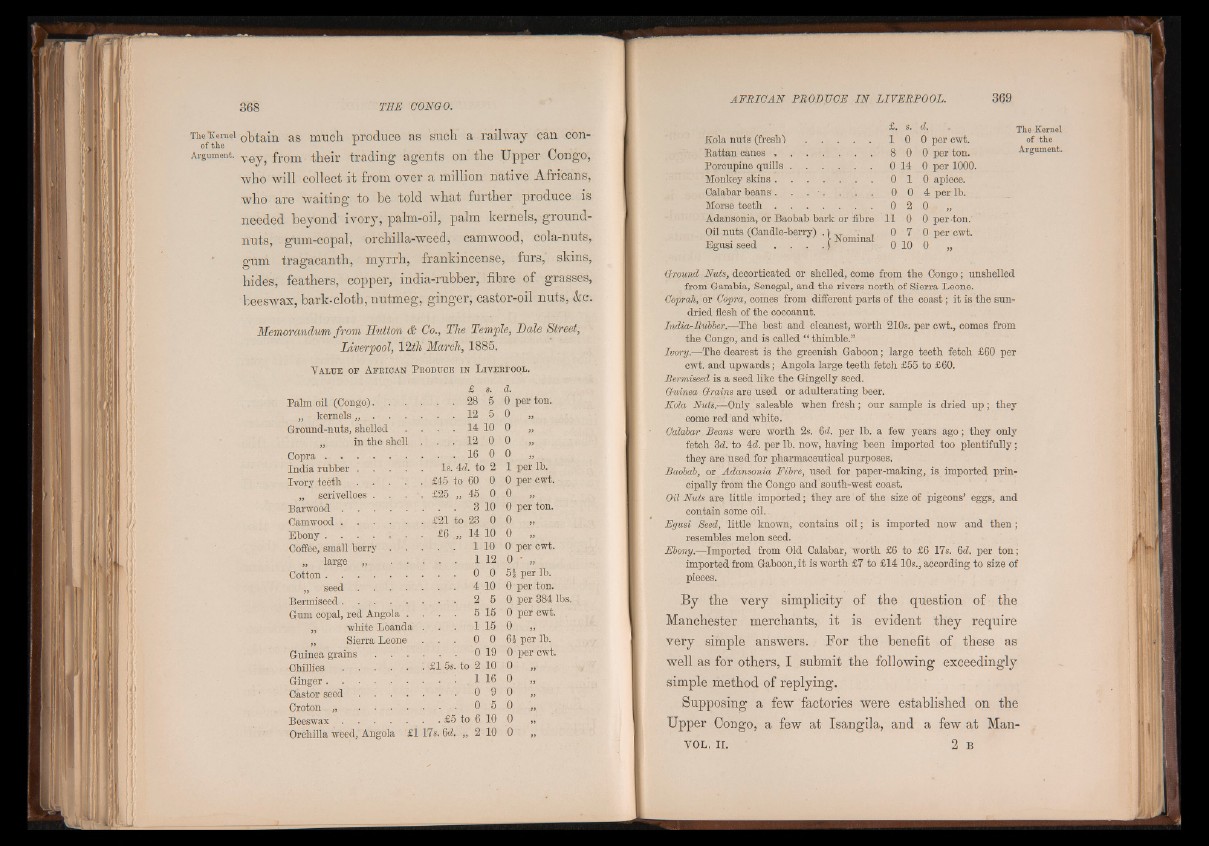
nel obtain as much produce as such a railway can con-
L vey, from their trading agents on the Upper Congo,
who will collect it from over a million native Africans,
who are waiting to be told what further produce is
needed beyond ivory, palm-oil, palm kernels, groundnuts,
gum-copal, orchilla-weed, camwood, cola-nuts,
gum tragacant.h, myrrh, frankincense, furs,* skins,
hides, feathers, copper, india-rubber, fibre of grasses,
beeswax, bark-cloth, nutmeg, ginger, castor-oil nuts, &e.
Memorandum from Hutton & Co., The Temple, Hale Street,
Liverpool, 12th March, 1885.
V alue oe African P roduce in L iverpool.
£ s. d.
Palm oil (Conga). . . . . 28 5 0 per ton.
„ kernels „ . . . 12 5 0 „
Ground-nuts, shelled . . 14 10 0 JJ
„ in the shell . . 12 0 0 ' ,\99 -
Copra . . . . . . 16 0 0 99
India rubber . . . . Is. Ad. to 2 i
- fper lb.
Ivory teeth . . . . £45 to 60 0 0 per cwt.
„ scrivelloes . . . ' £25 „ 45 0 0 33
Barwood . . 3 10 0 per ton.
Camwood . . . . . £21 to 23 0 0 Ü
Ebony . . . . . . £6 „ 14 10 0 33
Coffee, small berry . . . 1 10 0 per cwt.
„ large „ . . . . 1 12 0 33
Cotton............................. . . 0 0 51 per lb.
„ seed . . . . . . 4 10 0 per ton.
Bermiseed . . , . 2 5 0 per 384 lbs.
Gum copal, red Angola . . . 5 15 0 per cwt.
„ white Loanda . . 1 15 0 93
„ Sierra Leone . . 0 0 61 per lb.
Guinea grains . . . . 0 19 0 per cwt.
Chillies . . • • • £1 5s. to 2 10 0 39
Ginger. . . . , . : 1 16 0 - 99
Castor seed . . . . . . 0 9 0 33 .
Croton - „ , . • • . . 0 5 0 99
B e e sw a x ....................... . £5 to 6 10 0 99
Orchilla weed, Angola £ 1 17s. 6d. „ 2 10 0 99
Kola nuts (fresh1)
Battan canes .
Porcupine quills
Monkey skins .
Calabar beans .
Morse teeth .
Adansonia, or Baobab bark or fibre
Oil nuts (Candle-„ . , berry) .)> N_ _o mi. nal, Egusi seed .)
£. s. d . The Kernel
1 0 0 per cwt. of the
8 0 0 per ton. Argument.
0 14 0 per 1000.
"0 1 T i apiece.
0 0 4 per lb.
0 2 0 99
11 0 per ton.
0 7 0 per cwt.
0 10 0 99
Ground Nuts, decorticated or shelled, come from the Congo; unshelled
from Gambia, Senegal, and the rivers north of Sierra Leone.
Coprah, or Copra, comes from different parts of the coast; it is the sun-
dried flesh of the cocoanut.
India-Rubber.—The best and cleanest, worth 210s. per cwt., comes from
the Congo, and is called “ thimble.”
Ivory.—The dearest is the greenish Gaboon; large teeth fetch £60 per
cwt. and upwards; Angola large teeth fetch £55 to £60.
Rermiseed is a seed like the Gingelly seed.
Guinea Grains are used or adulterating beer.
Kola Nuts.—Only saleable when fresh; our sample is dried u p ; they
come red and white.
Calabar Beans were worth 2s. 6d. per lb. a few years ago; they only
fetch 3d. to 4d. per lb. now, having been imported too plentifully;
they are used for pharmaceutical purposes.
Baobab, or Adansonia Fibre, used for paper-making, is imported principally
from the Congo and south-west coast.
Oil Nuts are little imported; they are of the size of pigeons’ eggs, and
contain some oil..
Egusi Seed, little known, contains oil; is imported now and then ;
resembles melon seed.
Ebony.—Imported from Old Calabar, worth £6 to £6 17s. 6d. per to n ;
imported from Gaboon, it is worth £7 to £14 10s., according to size of
pieces.
By tbe very simplicity of the question of tbe
Manchester merchants, it is evident they require
very simple answers. For the benefit of these as
well as for others, I submit the following exceedingly
simple method of replying.
Supposing a few factories were established on the
Upper Congo, a few at Isangila, and a few at Man-
VOL. I I . 2 b